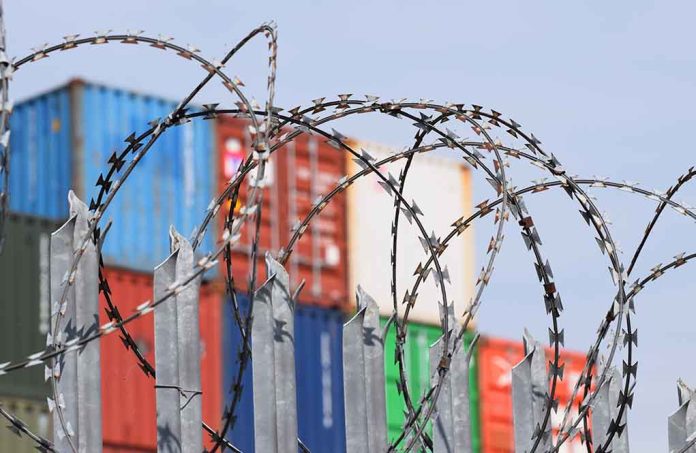
President Trump abruptly reversed course on his administration’s newly imposed tariffs against Canada and Mexico, granting exemptions until April 2 after significant pushback from businesses and trading partners.
Key Takeaways
- Trump has temporarily shelved tariffs on goods from Canada and Mexico until April 2, just days after imposing them.
- Products covered under the USMCA trade agreement will be exempt from the tariffs, affecting approximately 50% of US imports from Mexico and 38% from Canada.
- The reversal came after warnings from automakers about supply chain disruption and retail CEOs cautioning about grocery price increases.
- Despite the exemptions, Trump maintains his broader tariff strategy, including increased duties on Chinese goods, as part of his plan to reduce America’s trade deficit.
- Both Canada and Mexico had announced retaliatory tariffs in response to the initial US measures, creating concerns about an escalating trade war.
Sudden Policy Reversal
Just two days after implementing new tariffs on goods from Canada and Mexico, President Donald Trump has granted both countries significant exemptions through April 2. The original tariffs, which included 25% duties on all goods from Mexico and most goods from Canada, along with 10% on Canadian energy products, sparked immediate concerns about economic disruption and retaliatory measures. The abrupt policy shift came after discussions with Mexican President Claudia Sheinbaum and amid mounting pressure from American businesses warning of supply chain issues and increased consumer costs.
“After speaking with President Claudia Sheinbaum of Mexico, I have agreed that Mexico will not be required to pay tariffs on anything that falls under the USMCA Agreement,” Trump wrote on Truth Social.
The exemptions will cover goods that fall under the United States-Mexico-Canada Agreement (USMCA), representing about half of US imports from Mexico and over a third from Canada. Trump announced the change on his social media platform, stating that Mexico would receive relief from tariffs for products covered under the trade deal.
Trump announces temporary changes to tariffs https://t.co/gdYnH7qwcP pic.twitter.com/cUlGLXjZVS
— New York Post (@nypost) March 6, 2025
Industry Concerns Drive Exemptions
The reversal appears largely driven by intense pressure from American businesses, particularly automakers and retailers who warned of severe economic consequences. Major car manufacturers received a one-month reprieve earlier in the week after cautioning that the tariffs would seriously disrupt their supply chains, which are deeply integrated across North America. Retail executives also raised alarms about potential price increases in grocery stores and other consumer goods, highlighting the immediate impact tariffs would have on American households already concerned about inflation.
“I did this as an accommodation, and out of respect for, President Sheinbaum. Our relationship has been a very good one, and we are working hard, together, on the Border, both in terms of stopping Illegal Aliens from entering the United States and, likewise, stopping Fentanyl. Thank you to President Sheinbaum for your hard work and cooperation!” Trump elaborated.
In his joint address to Congress, Trump acknowledged there might be “a little disturbance” from his tariff policies but insisted the administration was “OK with that” in pursuit of its larger trade objectives. The initial announcement of tariffs had triggered a stock market sell-off, with investors concerned about potential economic damage and inflationary pressures. Economists have consistently warned that tariffs are ultimately paid by American importers, not foreign countries, contrary to some political messaging.
Broader Trade Strategy Remains
Despite the exemptions for Canada and Mexico, Trump’s broader tariff strategy appears intact. The administration has doubled tariffs on Chinese exports from 10% to 20%, maintaining pressure on America’s largest trading partner. Trump has repeatedly cited the US trade deficit, which reached a record $131.4 billion in January, as justification for his aggressive tariff policies. He has blamed the deficit on his predecessor, Joe Biden, and vowed to reduce it through a combination of tariffs and trade negotiations.
The temporary exemptions suggest the administration may be using tariffs as leverage in negotiations with Canada and Mexico on issues beyond trade. The one-month timeline creates urgency for further negotiations while giving businesses temporary relief from disruption.









